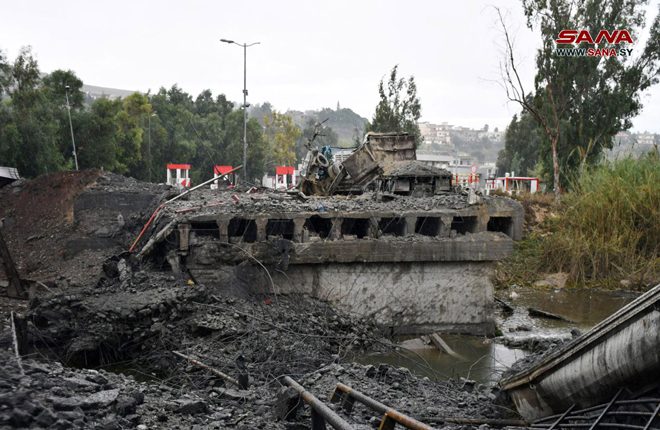Israeli Airstrikes on Syria Destroy Bridges in Homs and Tartus
DAMASCUS, Syria (North Press) – The Syrian Ministry of Transport reported significant damage to key bridges in the Homs and Tartus countryside following Israeli airstrikes early Wednesday morning. The attacks targeted infrastructure along the Syrian-Lebanese border, leaving six dead, including two government personnel, and injuring 12 others.
According to state media SANA, the destroyed bridges include Al-Dabbousiyah’s concrete and metal bridges, Qamar Bridge, and Jubaniyah crossing in the Homs countryside. These bridges are crucial for connecting Homs with the Lebanese border, and their destruction has severed the movement of civilians and vehicles in the region.
Impact on Homs Countryside
Nabil Aqoul, Director of the General Road Transport Corporation in Homs, told SANA that the Israeli strikes caused extensive damage to the targeted infrastructure. “These bridges are vital for linking Homs province to Lebanon. Their destruction has halted transportation for residents and vehicles,” Aqoul said.
Destruction in Tartus
Similarly, the Tartus branch of the General Road Transport Corporation confirmed the complete destruction of Al-Areedah Bridge, a critical link across the Al-Kabeer Al-Janoubi River. Hussein Nasser, the branch director, described the damage as “severe,” noting that the bridge’s pillars and deck were destroyed, along with the parallel older bridge.
“The Al-Areedah Bridge plays a crucial role in connecting Tartus with the Lebanese border, supporting the flow of residents and facilitating cargo and road transport,” Nasser added.
Military and Human Toll
The strikes, reportedly targeting border crossings in western Homs between Syria and Lebanon, caused substantial casualties. Six people, including two members of the Syrian government, were killed, while 12 others sustained injuries, according to local reports.
Israel has not commented on the airstrikes, which follow a series of similar operations attributed to Israel in Syria. These actions typically target Iranian-backed militias and Hezbollah positions, aiming to disrupt arms transfers and military fortifications in the region.
Strategic and Humanitarian Implications
The destruction of key infrastructure not only isolates Syrian border regions but also exacerbates the already fragile humanitarian situation. Border crossings in western Syria serve as critical points for civilian movement and trade, and their loss could have long-term repercussions on regional stability.
Israel frequently conducts airstrikes in Syria, citing the presence of Iranian-backed forces and weapon transfers as threats to its national security. Damascus has consistently condemned these strikes, accusing Israel of violating Syrian sovereignty.
This latest escalation highlights the ongoing volatility in the region, where civilian infrastructure increasingly becomes collateral in military operations.

